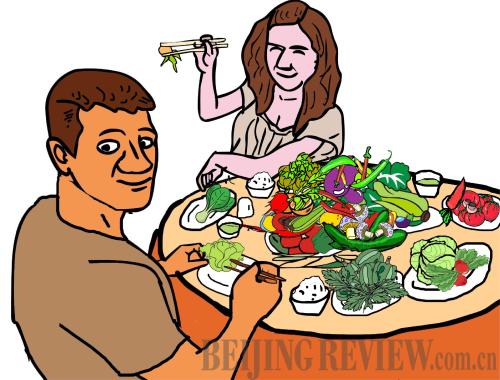|
 |
|
(LI SHIGONG) |
Coming to China was not an easy decision for me, having been a vegetarian since childhood. Everyone I met told me Chinese food contained nothing but meat. What's more, hailing from Nepal, birthplace of Buddha and the only Hindu country in the world where no beef is eaten, even by non-vegetarians, my friends frightened me saying that even the spices in China are mixed with the meat. At this point, I had next to no knowledge of the local cuisine.
The only memory related of food I carried was one of the long snake that a Chinese construction engineer used to eat for lunch in the southern part of Nepal some 20 years ago during the building of a road. Nostalgia not only took me back to my childhood, but also horrified me about remaining a vegetarian in China.
When searching for authentic information, the name Shantadas Manandhar, famous for writing child literature and translating many works by Lu Xun, came to my mind. While editing my three children books published by Room to Read, a charity-based organization in the United States, he mentioned in his witty style that Chinese people are capable of eating virtually any animal on the planet.
In September 2011, I finally landed in Tianjin in north China and the first thing I did was buy cooking utensils. All my zeal to cook faded when my university handed me a busy schedule of classes. The only way to keep myself alive at the time was going to the cafeteria.
On my first lunch break, I was met by a sea of students eating all at once. I was baffled about getting to the food myself. At last, unable to distinguish between vegetarian and non-vegetarian I settled for fruit.
Irregular eating habits soon started having an effect, however. Feelings of lethargy and anemia became so strong that even after shedding 15 kilos for the first time in my life without much effort and on the verge of realizing the dream of having a slim figure, nothing seemed pleasant to me anymore. This is when I decided to start cooking.
The turning point came when I visited Beijing during a national holiday. Seeing the Great Wall, the Temple of Heaven and the Beijing Zoo were all very exciting, but my best experience was eating vegetarian food in a restaurant near the Summer Palace, which totally changed my impression of Chinese cuisine.
Returning to Tianjin, I took courage and again ventured into the cafeteria. When I told the serving lady that I don't eat meat in Chinese (bu chi rou), everyone stared at me as if I were from the Mars. Many have found me being vegetarian strange because of my high Body Mass Index!
From then on, each time I entered the cafeteria, waiters would utter "bu chi rou lai le," signaling the person not eating meat has arrived. So, I got the new nickname "bu chi rou" that literally means not eating meat. To my surprise, I discovered many vegetarian food options and have fallen in love with Chinese delicacies. Against the expectations of many people back home, I have managed to remain a vegetarian thanks to these three words: "bu chi rou!!!"
However, the same three words gave me a lot of trouble on a flight from Tianjin to Kathmandu via Seoul during which I was served nothing but cold fruit. Things were less complicated when I returned to Tianjin. I have since realized that the ticketing manager did actually ask me whether I would prefer only fruit or other vegetarian options. With my poor knowledge of the Chinese language I shook my head with confidence, having already said "bu chi rou." Such overconfidence eventually made me take medicine for tonsillitis.
The words "bu chi rou" again caused problems when I ordered noodles without meat after visiting Lu Xun museum in Beijing during September 2012. The two boiled eggs in the dish put me in a dilemma because I don't eat eggs or fish either. That day I realized saying only "bu chi rou" was not enough. It was then I learned a new word, su shi zhe, to express myself as a vegetarian.
I learned a lot more about vegetarian cuisine when my Chinese language teacher gave us homework to describe one local dish. While searching for information, I realized that China must have been one of the first countries in the world to use numerous plants, various animals and lots of spices in food, thanks to its great civilization and long history. While a range of vegetarian options does exist on Chinese menus, correctly expressing the fact that you don't eat meat is of the utmost importance.
The writer is a Nepalese living in Tianjin | 